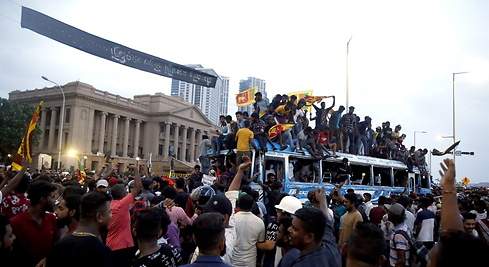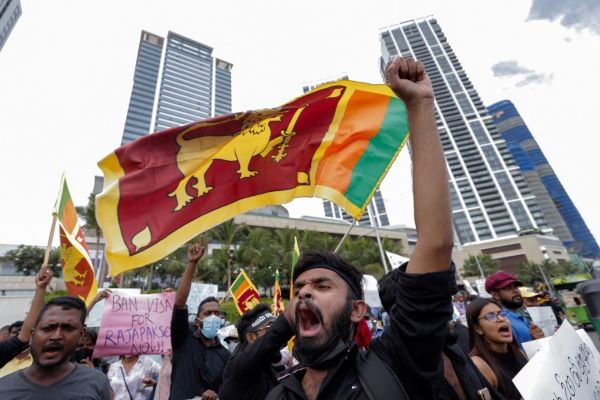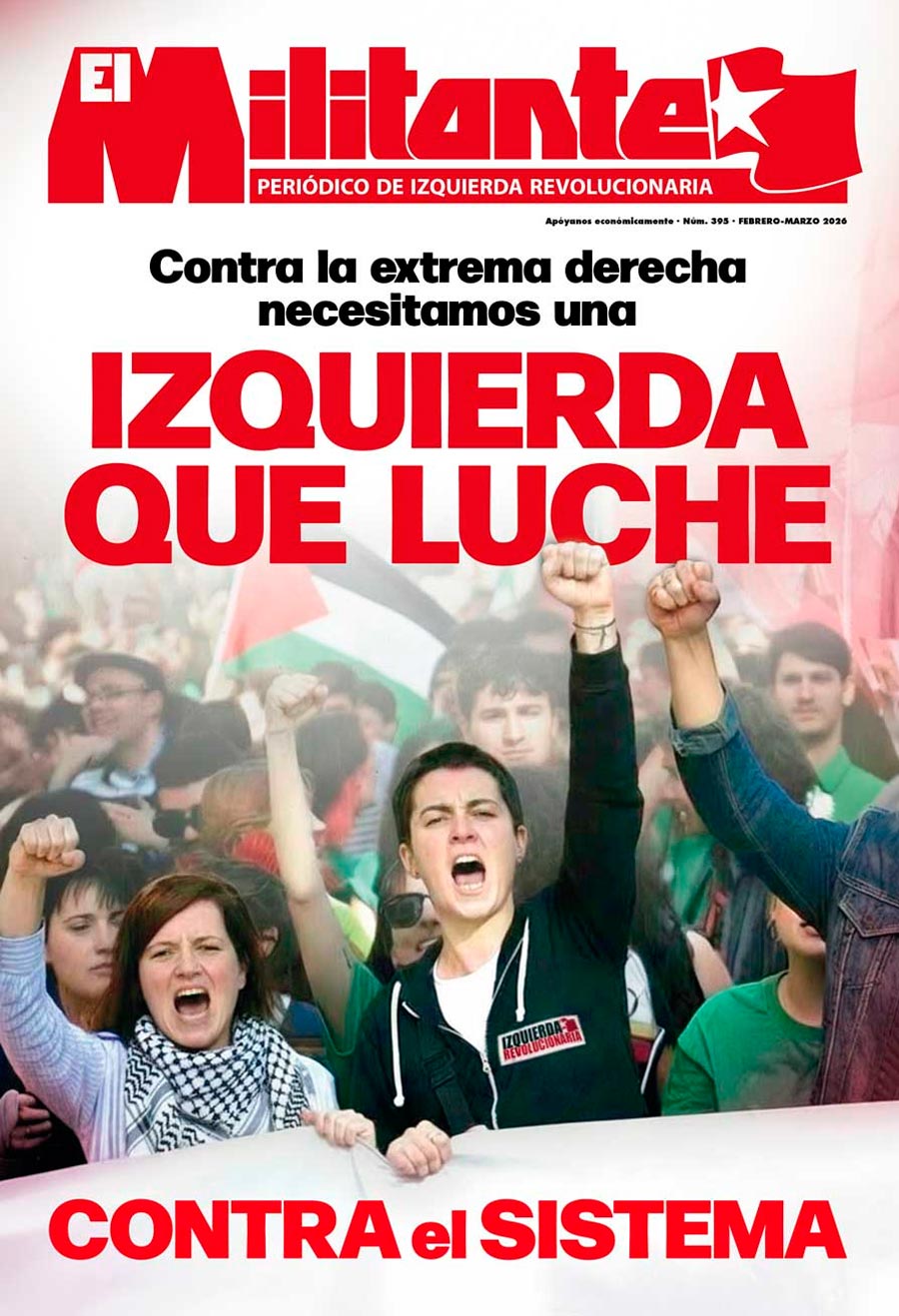The popular uprising that began in Sri Lanka last March has turned into a true revolution.
Hundreds of thousands of demonstrators have taken to the streets in Colombo, the country's capital, and, overwhelming the military and police forces that were protecting it, have stormed the presidential palace. President Gotabaya Rajapaksa has had to flee and his whereabouts are officially unknown, although the Indian press reports that he has left the country on a warship.
The economic crisis and the revolutionary uprising
We explained in detail the causes of the Sri Lankan uprising in an article published six weeks ago https://www.izquierdarevolucionaria.net/index.php/internacional/asia/13166-el-estallido-revolucionario-en-sri-lanka-continua-y-fuerza-la-dimision-del-primer-ministro. This material, of required reading at this moment, explains how the economic crisis, the worst the country has suffered since its independence, has pushed millions of working-class and peasant families into misery and despair. The lack of fuel, the continuous power cuts and the stratospheric rises in the prices of food and other basic products have exhausted the patience of the Sri Lankan population. A process that will inevitably be repeated in many other countries.
The crisis was used by the IMF to try to impose, in agreement with the ruling parties and the Sri Lankan bourgeoisie, a brutal adjustment plan. Foreign debt holders, behaving like scavengers, saw a golden opportunity to extract even more profits, and flatly refused to grant even the slightest relief.
After days of spontaneous and massive protests, the unions called the first general strike since 1980 on April 28th, demanding, among other things, the president’s resignation. On May 6th, the general strike was repeated and as of that day a good number of productive sectors in Sri Lanka have continued on indefinite strike.
The government's response was bloody repression, using both the police and the army as well as the fascist gangs that already spread terror at the time of the war against the Tamil people, a harshly oppressed national minority. But this repression did not scare the demonstrators. Quite the contrary: the protest grew in intensity and eventually forced the prime minister to resign.
Indiscriminate repression, as we have repeatedly seen in previous revolutionary situations, has the effect of cracking the discipline of the armed forces. In the images arriving right now from Sri Lanka, members of the army and the police are seen joining the protesters. The state apparatus is in dire straits, cracking, and dual power elements are defiantly advancing. The conditions for imposing a government that truly represents the workers, the peasants and all the oppressed sectors of the country's population have reached an evident point of maturity. A government that could expropriate the national and imperialist capitalists, the landlords, and on the basis of the revolutionary committees that have already emerged, generalize them, unify them and open the road to socialism.
A police officer supports the protest amidst loud applause from the protestors. #LKA #SriLanka #SriLankaCrisis #July9th pic.twitter.com/Ld9tgFS6Qi
— Sri Lanka Tweet ???????? ???? (@SriLankaTweet) July 9, 2022
All power to the working class! For a revolutionary government with a socialist program!
That government, the only one capable of changing things, cannot be based on the same state apparatus that for decades served to oppress and exploit the vast majority of the population. The Sri Lankan working class, with formidable revolutionary traditions, has to rely on its own organs of power. It has to take into its hands the centers of economic decisions, the control of banking and monopolies through their nationalization without compensation, the management of communications and the rest of the infrastructures.
With the economy under democratic control of the working class and its organizations, the decisions could be immediate: freeze the prices of basic products, raise wages, expropriate the rich, put an end to the maneuvers of speculators and hoarders through direct action, organization of workers' and popular militias making an effective appeal to the soldiers, replacement of the bourgeois courts by organs of revolutionary justice...
This morning (for Saturday July 9th), while part of the protesters took over the presidential palace, another part went to the Central Bank. It is a correct decision, but to control financial power it is not enough to occupy a building. The movement must go one step further and organize workers' committees in all financial centers to control funds, prevent capital flight and promote the nationalization of the sector. This is the task of all organizations that claim to be revolutionary. It is time to rise to the occasion and comply with the mandate of the insurgent people.
As long as the country's productive resources remain in the hands of the national capitalists and their imperialist masters, it will be impossible to successfully confront the situation of misery that affects the vast majority of the population. Nor should the current wave of support from members of the armed forces for the revolution be naively relied upon. It is the soldiers who join their class brothers and sisters. But what about the caste of officers and chiefs? Without a doubt they will already be making plans to regain control of the situation and drown the protest in blood, probably with the aid of some foreign imperialist power. The only way to avoid this is by disbanding the actual army and substitute it with a workers’ militia, distributing weapons for the revolution to be defended by its own protagonists.

The depth of the capitalist crisis and the decomposition of its system of domination put back on the agenda the urgent need for socialist revolution and a strategy to win. After the first wave of revolts that followed the triggering of the 2008 crisis, including the Arab Spring, a good number of dictatorial regimes collapsed all over the world. But the change remained in purely cosmetic political reforms that were soon reversed and betrayed. The economic and social foundations did not change, the problems that had caused the upheavals continued to deepen, and finally the rebellious momentum was exhausted under the merciless pressure of daily necessity and the maneuvering of the ruling class and Western powers.
Today, the masses of Sri Lanka are leading a social revolution along classical lines, although the conscious factor of this revolution, the party, is not present and it is essential to build it in the course of the struggle. The coming days and weeks will be decisive, but one thing is clear: the good words and promises of the various cliques of bourgeois politicians lead absolutely nowhere. The population wants real change and they want it now, and only the program of socialist revolution will be able to offer a decisive solution to their demands.
Sri Lanka is the first episode of a global revolutionary wave
Nothing that has happened so far in Sri Lanka is exceptional or particular to that country. The problems facing oppressed Sri Lankans are the same ones we are facing working class and poor people all over the planet.
It is inevitable that events such as those in Sri Lanka will repeat throughout the globe in the coming months. The crisis affects the very essence of the capitalist system which, under these circumstances, proves incapable not only of improving the living conditions of the population, but not even of maintaining a situation that for hundreds of millions of people is already at the limit of life.

We saw the response of capitalism to its structural crisis a few days ago at the NATO Summit: a disproportionate increase in military spending, and preparing to crush any attempt to put an end to the inadmissible privileges of the bourgeois elite.
Also we, workers, young people, all of us who with our work generate social wealth, that same wealth that a tiny minority of potentates usurps, we have to prepare ourselves for the next battles ahead.
Our decisive weapon is revolutionary mobilization and organization. The crisis of capitalism, with its ever more imminent threat of war and destruction, demands a socialist response. It is necessary and urgent now to prepare the revolutionary left capable of intervening in events with a program and an action plan that ensures the triumph of popular mobilization. The massive response to the capitalist crisis has begun to get underway and our obligation is to build the organization that will make victory possible. For a socialist future for mankind!




















































